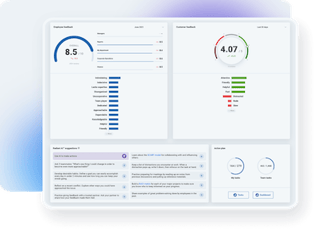
5 Types of Employees Who Won't Take Your Survey
You know that employee survey you've been working on designing and distributing for months? The survey whose data you'll use to identify key issues- the foundation on which you'll construct a sweeping plan of action to improve employee engagement and company performance?
Statistics indicate that only 1 in 3 employees will complete that survey.
Many immediately attribute this to survey fatigue, which we've written about in detail before. But while survey fatigue looms over any well-intended effort to collect employee feedback, it is ultimately a symptom- not the illness. The core issue with surveys that dooms them from the start with most employees is this:
They take too much effort.
For a survey architect, we know that's hard to swallow. But in order to maximize the value of any feedback initiative, you need to understand and address the reasons employees may not put forth the effort. Here are 5 types of employees who aren't likely to complete your survey:
1. Employees on the road
62% of US employees regularly travel across state lines for work. For sales, consulting, field support, and management personnel, this time on the road is often substantial, cutting into workdays and personal lives. Here is a brief look into the life of one traveling employee:
"I wake up from a power nap on a red-eye flight to 100+ emails in my inbox. I squint into my laptop screen and battle with the spotty wifi to clear out as many messages as possible before I land and head straight into a full day of meetings. Any email that doesn't pertain to my impending deadlines is skimmed and marked as read. Most of them are never opened again."
The constant disruptions of travel force these employees to ruthlessly prioritize how they spend their time. If your survey can't be completed in a few seconds, many employees on the road won't waste their attention on it.
2. Employees who don't sit at a desk
80% of employees work jobs that don't allow them to sit at a desk for most of the day. For these employees, logging into and checking their corporate email is rarely part of their daily routine. In fact, a recent study indicates that 83% of deskless employees do not have a corporate email address. Nearly all survey software is designed for use on computers with email, which makes getting feedback from these employees a non-starter.
Surveys that can be deployed and completed on smartphones are ideally suited to the needs of both desk and deskless workers. Mobile-first surveys make giving feedback simple and accessible by texting direct links to surveys that can be completed in just a few seconds with a few taps.
3. Employees who work part-time
In 2019, 25 million people in the US were working part-time. Research from ADP reveals that part-time employees, especially those working 2 or more part-time jobs for different companies, are less likely to be engaged than full-time employees. Part-timers are also less likely to be informed on corporate events, as they often lack the access or training necessary to use employee communication platforms.
This combination is a recipe for apathy toward surveys and feedback. If giving feedback is doable for full-time employees but cumbersome/impossible for part-timers, it sends a clear message that their perspectives don't matter as much. Part-timers need to be assured that the company cares to hear what they have to say, which requires designing and implementing a feedback experience that is equally accessible to all employees.
4. Employees working 100% remotely
According to Gallup, employees who work remotely 100% of the time are the least engaged of all remote workers. Stanford Research also indicates that 42% of US employees are working from home in 2020, nearly double the number of employees working on-site. For most employees, this was an abrupt- in many cases literally overnight- transition. Even further, Most companies did not have the time nor the resources to implement tools for remote work under the circumstances,
This has led to more remote workers feeling disconnected from their teams and companies. When employees don't feel a sense of connection to their company and its mission, they're unlikely to take time out of their day to answer questions to help the company improve.
5. Employees who are overloaded
This encompasses everyone on this list and then some. We all have a million things on our plate. Even if we could somehow carve out an uninterrupted 30 minutes in our days, would we really want to spend it clicking through 50+ questions about work, while more work piles up in the background?
This is why your employee survey must be fast, easy, and accessible. Employees everywhere are being asked to do more with less. In these unprecedented times, it's more important than ever that we listen to our employees and address their concerns. But when we burden employees with lengthy, cumbersome surveys, we're actually undermining that goal. We don't need 50+ questions to isolate and address employees' issues. We need fast, simple, and accessible feedback that captures every employee's perspective.





